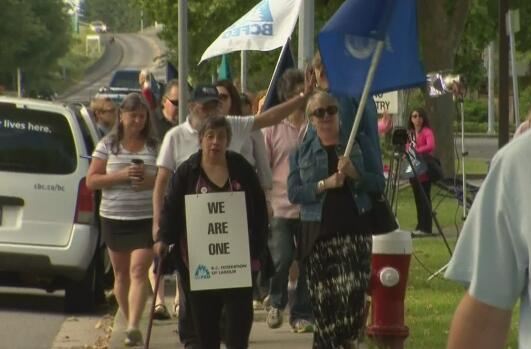
VANCOUVER — The union representing British Columbia’s striking teachers plans to spend the final week before the scheduled start of classes increasing pressure on the provincial government by resurrecting picket lines, airing radio ads and staging rallies.
And while it remains unclear whether students will be returning to their classrooms next Tuesday, principals and other support staff such as janitors were preparing for schools to open in the event of a last-minute deal.
Teachers have been on a full-scale strike since June, though the summer has been mostly devoid of formal negotiations and the two sides have acknowledged they remain far apart.
B.C. Teachers’ Federation president Jim Iker used an annual teacher training conference in Kamloops over the weekend to call on the provincial government to enter into mediation immediately, while promising that teachers would be out in “full force” this week to pressure the Liberal government.
The teachers’ federation sent an email to its members that said union delegates had decided to “intensify the pressure and stay the course.”
Radio ads sponsored by the B.C. Federation of Labour are set to air starting Wednesday, the email said, while the organization is also planning several events leading up to a “mass rally” on Sept. 5 outside the premier’s cabinet office in Vancouver.
Other rallies were being planned on separate days next week outside Education Minister Peter Fassbender’s constituency office in Langley; outside Christy Clark’s office in Kelowna; and outside Labour Minister Shirley Bond’s office in Prince George. Protests were also planned across the province on Labour Day.
The email said “study sessions” would be organized if a deal is not reached by Sept. 5, and that teachers should watch for further updates.
Earlier this month, veteran mediator Vince Ready agreed to monitor the dispute between the union and the B.C. Public Schools Employers’ Association, which bargains on behalf of the provincial government. Ready said he would be prepared to enter into full mediation if doing so would be productive.
The union said no talks were currently scheduled.
The two sides had agreed not to speak publicly, but both Iker and Fassbender have been recently speaking to media.
On Monday, an emailed statement from the minister’s office said the employer is ready to start mediation as soon as Ready deems it will be “productive.” Fassbender also re-iterated that government has “no desire” to legislate an end to the dispute.
Iker did not respond to a request for interview.
B.C. School Trustees Association president Theresa Rezansoff said she’s hopeful that the teachers’ union and the employer will find common ground soon.
“There’s not a lot of time left,” Rezansoff said. “Schools will be able to open on Sept. 2 if a deal is reached.”
Steve Cardwell, the superintendent of the Vancouver School Board, posted an online message to parents explaining how the board would respond, whether a settlement is reached or not.
Cardwell’s letter said the district would wait until Friday to announce whether schools would open “to provide both parties with the maximum amount of time to reach a negotiated settlement.”
The letter said parents shouldn’t send students to school if teachers remain on strike and it urged them to make alternate child-care arrangements.
Even if a new contract is reached, the letter said the board was still anticipating some disruptions to instruction, as timetables for post-secondary students might need to be changed.
“Our intention is that we return as quickly and smoothly as possible to normal school operations,” states the letter.
The Liberal government has announced that if the teachers’ strike continues into the fall, it will give parents with children aged 12 and under $40 a day to cover the costs of child care or tutoring.
Several organizations were rejigging staff to provide additional care, including the YMCA and Boys and Girls Club.
Carolyn Tuckwell, president of the south coast Boys and Girls Club, said the organization would ensure their usual roster of 3,000 children would be covered.
“From our perspective, it’s a little bit of a moving target,” she said. “What drives us is knowing that the worst case scenario is kids are supervised.”
Tuckwell said the sentiment from parents was not emotional so much as just being practical, with a shared recognition “the issues are complex.”
The YMCA of Great Vancouver said it could provide nearly 1,200 day-camp spaces, but had accumulated full wait lists for all locations except two.
The province’s 40,000 teachers staged several weeks of rotating strikes before launching a full-scale strike two weeks before the end of the school year.
The main issues in the dispute have been wages and teaching conditions, such as class size and class composition.
The government has said teachers’ wage increases must be affordable and in line with agreements signed by other public-sector employees.